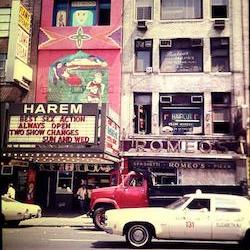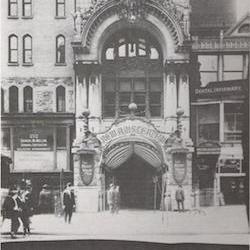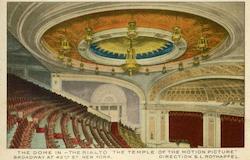#my grades haven’t been this bad since the height of COVID i thought something about me had gotten better but apparently not
Text
THE CHISELER INTERVIEWS ANDY McCARTHY

Chiseler: Please tell our readers when you began digging into obscurantist concerns -- these strange and neglected corners of New York history. Give us a sense of how it all started, and some idea of the scope here.
Andy McCarthy: I worked as a New York City tour guide on the red doubledecker buses between 2004 and 2011, and Times Square was one of the highlights of the tour. The tour began and ended in Times Square — New York begins and ends in Times Square. The history of the world's entertainment district is a big subject — lots to talk about and always more to learn. Plus everyone hates Times Square. Elmo probably even hates it. So it was even more inspired to find the appreciation for the experience of it as it is now in the present. Like going to a Starbucks in the East Village and finding yourself talking to the ghost of Joey Ramone, who loves the Tall Blonde. West 42nd Street in particular was always a synapse-inducing subject — it isn't that it's obscurantist (except maybe for understanding the real estate chronology), but that there are a million ways of approaching it — it's the brightest neighborhood in America after all — the old theaters, the showbiz history, labor action, smut lore, the "cleanup" and failed redevelopments before the final wrecking ball in the 1990s, etc. Anyhow in 2012, film programming friends were putting together a series that revolved around the history of W. 42nd Street — they called it THE DEUCE, after the nickname for the block between Seventh and Eighth Avenues. The idea was to program a movie that once played in one of the theaters on the Deuce, and I would perform an intro monologue/ slideshow about the history of the theater. We did our first screenings in the backroom of Videology on Bedford Ave in Williamsburg, and then evolved to the proper movie chambers of Nitehawk Cinema in 2013, where as of March 2020 we have done about 80 screenings. Don't call me an expert but the pop legacy and damaged psyche yielded by the Glittering Gulch has consumed my research panascope like a large bucket of stale popcorn you can't stop shoving it in with gulps of fountain Coke during a matinee of Wolfen. For the last six years I've worked as a reference librarian at NYPL at Fifth Ave and W. 42nd (not the Deuce). My division is US History, Local History, and Genealogy - we get all the NYC history questions. At NYPL the resources available in researching each month's DEUCE spiel far surpass the amount of tips bagged at the height of tourist season by the Naked Cowboy.
Chiseler: When I was 15 or 16 years old, a suburban Jersey kid, I would occasionally take the bus to Port Authority with $20 in my pocket. It was a magical place in the 70s and 80s. Can you tell us something about the porn scene in those days, maybe its larger history, and how it relates to the evolution of your Nighthawk Cinema?

McCarthy: I’m generalizing, but the porn business in Times Square seems a combination of obscenity laws and the real estate market (versus the city and state imposing change). Obscenity laws had increasingly loosened since the 1960s and by the 1980s so many cases ruled in favor of pornography that the pursuit of smut peddlers evaporated like dots of old money shots on a mattress at the Elk Hotel. Sure Edwin Meese led a commission against porn in Reagan's Morning in America as a coalition of the religious right against the entire ethos of the 1970s, but it doesn't seem to have achieved anything other than beleaguering feminist activists who opposed the rampant exploitation of women in pornography only to find a black hole of political alignment with right wing morality police. Live sex shows and bestiality periodicals were then the product of free speech. Meanwhile, big business had no interest in occupying or redeveloping the commercial spaces in Times Square. But landlords held on to the old buildings and theaters — occupied by movie theaters, sex shops, etc. - waiting for a future time when the demand for Times Square real estate upped the value and they might cash in. The neighborhood became a sex district mostly because these were the only businesses that would pay rent in the area — which most New Yorkers supposedly avoided. And it was the 1970s — the white middle-class had fled, it was a party town, the city was broke, its own redevelopment efforts continually failing on the Deuce, where the racial patron and hangout demographic was majority Black, and drugs and prostitution were viable business. But the theaters on the Deuce mostly didn't play porn. The Victory (today the "New Victory") played triple-X and the Harem was a 24 hour porn box — but you had more opportunity to see First Blood or What's Up Doc? in the 8 or 9 other theaters on W. 42nd between 7th and 8th Avenue. XXX theaters were elsewhere in Times Square than the Deuce. Whether it was magical depends on one's experience of it at the time. Times Square has always been a fantasy factory and the DEUCE movie series we do exalts going to the movies, and even when the experience back then was rough, most reminiscences of people seeing movies on 42nd Street is a memory of great impact. We do not celebrate that it was so bad it was good (the same way we do not program movies that are "so bad they are good" — that crap is for bored minds who are less able to form an independent thought than the digital diode Coca-Cola sign at 47th and Broadway) — but it is a combination of place and experience in a matrix of moviegoing: there are many stories to tell about each theater, and the movies we program may take on new life in the forgetting chambers of Nitehawk Cinema. If porn ended up characterizing the business of Times Square when obscenity laws and real estate allowed it to, then no surprise — such is history…
Chiseler: I’m with you on “so bad it’s good” — a goddamn disease. I spend years of my life hunting down non-canonical titles, not with the tacky idea of establishing an alternative canon, but with the goal of subverting the very notion of canons. In other words, I’m seeking great films that establish their own criterion for greatness, compelling viewers to recognize them on their own ground. To expand your last answer a bit, would you mind dwelling on a few titles you’ve screened and tell our readers why you selected them?
McCarthy: OK — the DEUCE is a group effort. First off we are thankful for Nitehawk Cinema to have hosted the series for so long. I only do the intro monologue / slideshow on the history of a theater, while my co-jockeys — seasoned film programmers Joe Berger, Max Cavanaugh, and Jeff Cashvan — program the screenings, which are always a 35mm print, sprocketed by boothmaster Pro-Jo Joe Muto. The 35mm signature touch seems to be one of the ongoing draws for the audience, who routinely sell out the 90 seat theater, ahem... Cashvan puts together a list and Max tracks down a print (if one exists). The selections hinge on whether the movie once played in a theater on the Deuce, and the availability of a 35mm print — the experience of history in the screening zeroes down to the technology too. The movies are chosen because they have creative merit and yield enough for the viewer to determine if they are good or bad — or anything in between, which is much more interesting. Also we gotta honor the faith of the ticket-buyers and uphold any rep of the series, and not hash up some dumb time-wasting crap. Some of the flicks might be obscure, like Night of the Juggler (a gritty 1980 NYC exegesis on the type of race and class tensions too familiar under the U.S. presidency of the hurrahed bastard) or Teen Lust (bizarre sex romp directed by that-guy character actor James Hong) or Combat Shock (Vietnam vet psychodrama shot in Staten Island, including the Nam scenes), and other flicks are not obscure, like A View to a Kill or Tommy or Luna or Runaway Train... The crowds continually seem to enjoy a genuine going-to-the-movies experience; there is never any of that ironic insecure brainless hipster douchebag laughter that you get at some of these retro screenings that sizzles my nerves like hamburgers and franks on the grill at Grand Luncheonette at 229 W. 42nd Street next to the old Selwyn Theater — both places long gone. I saw Lost Weekend at BAM one time and was surrounded by people laughing at Ray Milland suffering from delirium tremens. What kind of loser pays $15 to act like that at a movie? Anyhow - those types don't come to these screenings. Some people come no matter what is playing, others for nostalgia or a particular love for a movie, others for whatever. No one is coming to experience the reenactment of a W. 42nd Street theater in 1982, which is not the intention — if it was we would just play grade-Z spaghetti westerns or Porky's sequels and allow smoking in the theater.
Chiseler: I realize that COVID puts a fairly long-term kaibosh on movie theaters. Where, if anywhere, do your hopes lie for continuing your work? Night of the Juggler ranks among my favorite films, by the way.
McCarthy: I am working on a book that corrals all the research I've done for the last 8 years. As far as reopening movie theaters, I have no clue. That is up to Nitehawk etc. The series is a theatrical communal thing. We haven't all been in touch about carrying things through the quarantine because there is no virtual alternative. As for Juggler it's too bad the movie is super unfindable. But how and where we obtained a one-time-only print will remain as undisclosed as a Gambino wiseguy taking the fifth.

6 notes
·
View notes